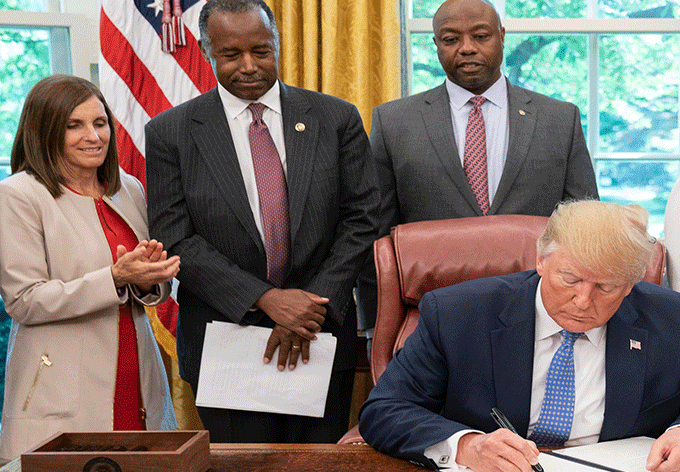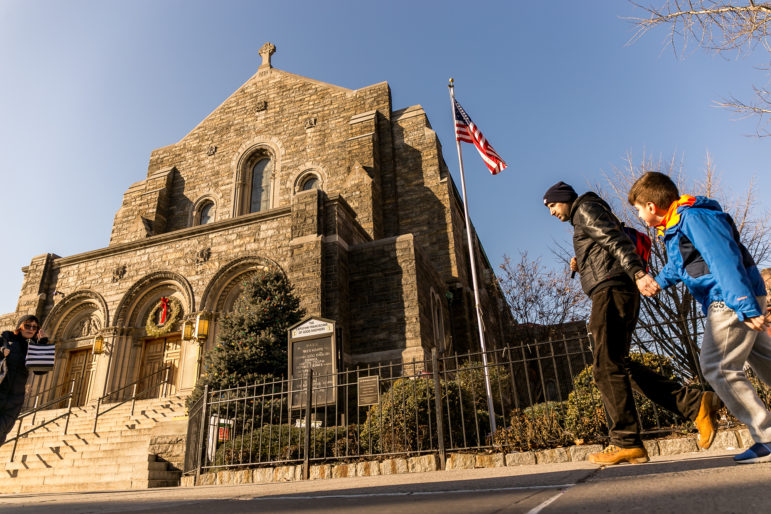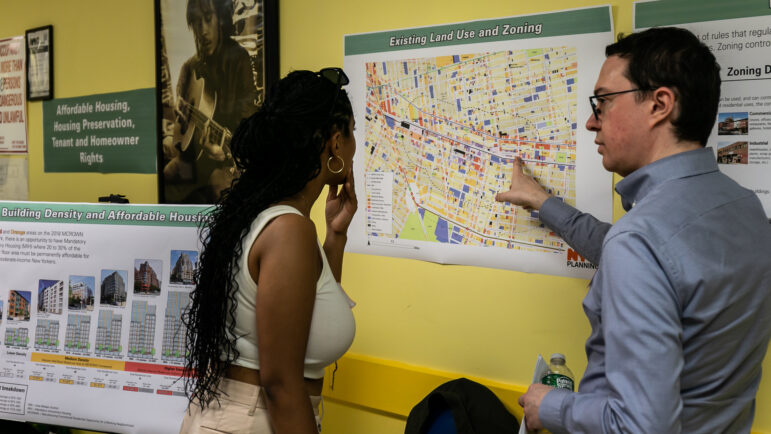
HUD
HUD Secretary Ben Carson (second from left) at a June White House event.
Under the Trump Administration, there has been a constant stream of attacks on immigrants. In some cases, we are able to thwart those attacks. Recently, New York Attorney General Letitia James secured a nationwide preliminary injunction that blocked the Trump Administration’s public charge rule change from taking effect. The injunction is a major victory for immigrants and their allies, but there is another problematic policy pending and advocates and elected officials must work together to stop it as well.
Back in April, the Department of Housing and Urban Development (HUD), the federal agency that funds Section 8 Housing Choice Vouchers and public housing, proposed a whole new family separation policy that even they admit is “ruthless.” Under current policy, if a member of a family living in subsidized housing is not a documented U.S. citizen, they pay a pro-rated rent that allows the family to live together while only using public funding to subsidize the rents of the documented family members. If Secretary Ben Carson gets his way, this common sense policy would be abolished, and instead families with one or more undocumented members would be told they must leave or separate, despite the fact that such a policy makes neither fiscal nor rational sense. Across America, immigrant communities have awaited what comes next with bated breath.
Perhaps most insultingly, Carson claims to be acting in the name of “protecting vulnerable populations.” Should HUD’s proposal be enacted it would hurt, not protect, the most vulnerable. It would upend the lives of thousands of New Yorkers by banning undocumented family members from living with their families in subsidized housing. The real effects of the rule change are well documented in HUD’s own analysis. In New York alone, 11,000 people who qualify for public housing assistance, including almost 5,000 children, could be forced out of their homes after facing an impossible choice: live separately from undocumented loved ones or get out.
For families that choose to stay together and are forced out of their homes, it isn’t difficult to imagine many ending up in the shelter system due to the dearth of affordable rental units in New York City. Unfortunately, there are many hoops that families with children under 18 years old applying for shelter must jump through in order to access their court-ordained “right to shelter.” While navigating these complex challenges, it is difficult for children to continue attending school and for parents to hold onto jobs, especially for those who are undocumented. Even if a family is ultimately accepted into the shelter system, they are only granted a temporary status with no guarantee for a longer stay.
Not only is the process of leaving a home and entering the shelter system costly for families and communities, it’s also expensive for taxpayers. The cost of providing emergency shelter for one family in New York City is $61,262 per year. HUD’s own analysis found that shelter subsidies for families facing homelessness after being evicted from subsidized housing could cost local governments far more than families staying together in their homes. The truth is clear: HUD would like to use taxpayer dollars to prop up hateful, anti-immigrant policies that are far less effective for families and more costly for everyone. As HUD reviews comments on the rule change, it has the opportunity to withdraw the proposal and commit to actually serving people who are vulnerable with policies that are fair, cost-effective, and beneficial to the social, political, and economic well-being of cities and families.
Susan Stamler is executive director of United Neighborhood Houses, a policy and social change organization representing 42 neighborhood settlement houses.









3 thoughts on “Opinion: HUD’s Proposed Rule is a Senseless Attack on Immigrants and a Waste of Funding”
You are saying illegals can do and actually do whatever they want.
No matter how much lipstick you put on them, they are still illegals. However, you say illegals are above the law. Lol
Go Trump 2020
Where does the op-ed say undocumented people can do whatever they want? I think it says that under current rules, which are the law, families with an undocumented member get to to live together. Does that really sound like anarchy to you?
So true. There is a law against harboring illegal aliens. Goes to show what a joke the laws are. The feds openly break their own laws. Good for Ben.